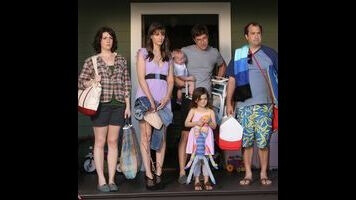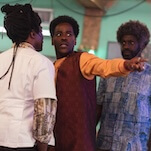Togetherness, the newest addition to HBO’s stable of dour comedies, is the first joint television project between Jay Duplass and Mark Duplass, the filmmaking duo who laid the foundations of the mumblecore movement with a body of work as acclaimed as it is polarizing. Typically, this would be framed as a coup for the medium, as further proof that episodic storytelling has evolved so dramatically, not even the most provincial auteurs can afford to ignore it. But in the case of Togetherness, the Duplass brothers’ foray into television is only surprising in that it didn’t happen sooner.
The director-driven, arthouse sitcom lives in constant fear of market oversaturation, thanks in large part to Lena Dunham and Girls. Since Dunham became a cultural lightning rod and the reluctant totem for the subgenre—an occasion since commemorated with an annual parade of prickly think pieces—there’s a heightened sensitivity to slight, quiet stories about loquacious white people trying to figure things out. The Duplass brothers helped make the world a safer place for those who, like Dunham, trade in privileged ennui, naturalistic dialogue, and awkwardly long takes, and Togetherness finds them at the top of their game. But as winning as the show can be, it arrives in the wake of Girls, Looking, Transparent, and the dearly departed Enlightened, imbued with a familiarity that can be a blessing or a curse from episode to episode—or even from scene to scene.
Mark Duplass stars as Brett Pierson, a man struggling to stave off dissatisfaction with his work as a Hollywood sound designer as well as in his relationship with Michelle (Melanie Lynskey). Brett’s wife and the mother of his two children, Michelle can’t manage to reverse her waning sexual attraction to her husband. The Piersons’ quest for greater intimacy is compromised further when Brett’s best friend Alex (co-creator Steve Zissis) and Michelle’s sister Tina (Amanda Peet) are concurrently hit with financial setbacks, prompting them to move in with the Piersons.
The under-one-roof log line makes Togetherness sound like an in-development CBS sitcom, but in keeping with the brand, the Duplasses have no interest in obvious punchlines and pat resolutions. Togetherness is about the unsettling nature of relationships, how they remain constantly in flux and only have as much stability as the participants choose to project onto them. The show mines similar themes to its contemporaries, exploring how an all-consuming desire for intimacy can curdle into a total aversion to it. But with characters in their late 30s, older, wiser and more settled, Togetherness has a world-weariness Girls could never achieve. Its characters have figured out how to navigate the pitfalls of youth, only to learn that every decade is as booby-trapped as the one preceding it.
Brett and Michelle face the same challenge as any married couple blessed with children. The person who was once a playmate becomes a co-worker at the world’s toughest job, a job from which there is never a moment’s respite. The Duplass’ knack for unvarnished emotions comes through when Brett asks Michelle bluntly why she doesn’t want to have sex with him, and she levels him with the simple, honest truth: “I don’t know.” They fumble to find a solution as if they’re thumbing through a marriage troubleshooting guide filled with pop-psychology clichés. She tries to spice things up with a clueless homage to bondage and domination, while he plans an overnight getaway hoping a change of scenery will be enough to shake them out of their chopsticks-and-Netflix routine.
Alex and Tina begin as rivals for the Piersons’ limited hospitality resources, then back into a genuine friendship complicated by Alex’s unrequited romantic feelings. This, too, sounds standard-issue, but Alex and Tina’s relationship provides Togetherness with its zestiest scenes. Alex, a struggling actor, wants the leading man roles on and off the camera, despite possessing all the physical indicators and personality quirks of a virginal schlub. Tina is an unbridled spirit in constricting dresses, unable to grasp that the “good time gal” image that landed her so many boyfriends is far less conducive to finding a husband. She makes Alex her mission, prodding him to get in shape and polish his presentation, but Tina and Alex have sharply divided views on what her investment in him actually means.
What the concept lacks in novelty, it mostly makes up with a sure-footed execution and all-in performances. Each of the four leads does stellar work, especially Lynskey and Peet. The former is strong enough to make a curiosity of her lengthy tenure on Two And A Half Men, while the latter lends Tina enough magnetism to buoy her during moments of extreme brattiness. But Zissis is the most pleasant surprise: He’s arguably too good at playing Alex, slipping so naturally into the chubby sidekick role it makes the character seem oblivious for thinking he can credibly pass himself off as something else.
Mark Duplass nails his performance too, but Brett is practically indistinguishable from characters Duplass has played time and again, most recently as the flustered husband in The One I Love. The on-screen Duplass is among the elements that makes Togetherness threaten to become too familiar; it isn’t rote, but feels like it could become rote at any moment before swerving away from the expected outcome with seconds to spare. Even as Michelle negotiates an extramarital flirtation, the vanilla ice cream of relationship dramas, the Duplass’ show how much thought they put into the nuances of her inexorable journey to the dark side.
Togetherness makes an ideal companion for Girls, as it walks the same fine line between candor and cynicism. It’s even better suited to a post-Girls time slot than Looking, which has the smallest appetite for cringe humor of the three sitcoms. Airing as a 90-minute block, the shows could easily become overwhelming, especially if they engage their darker impulses on the same week. It feels unfair to ding Togetherness for bearing tonal and thematic similarities to the art-house comedies that beat it out of the gate. But much like in the tenuous relationships the Duplass brothers have made a career of exploring, there’s no underestimating the impact of bad timing.








































